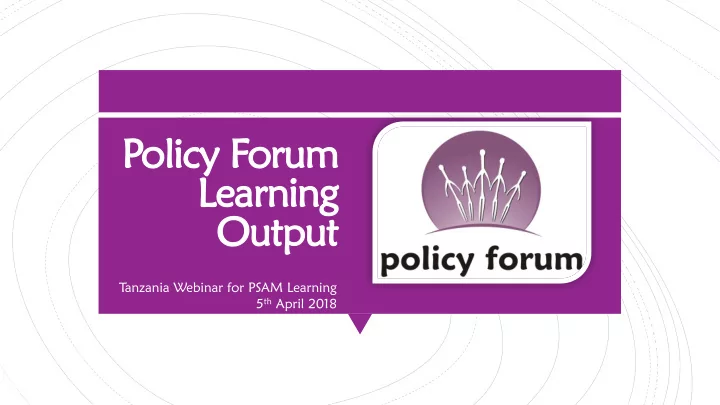

Policy Forum Learning Output T anzania Webinar for PSAM Learning 5 th April 2018
Policy Forum is network of 79 Tanzanian CSOs drawn to influence policy processes that help in poverty reduction, equity & democratization About Policy with a specific focus on public money Forum accountability at both central and local levels
Partnership established in 2008 • Policy Forum incorporated the Social Accountability • Monitoring (SAM) methodology as a solution to the reactive, piecemeal and fragmented nature by which the network previously tackled advocacy Policy Forum issues on governance and accountability SAM was also seen as a bottom-up and holistic way • and PSAM of addressing service delivery challenges at the community level. Partnership Trained more 30 member organizations on SAM • PF has partnered with 15 member organizations in • undertaking SAM at local level (how PF implemented SAM) Policy Forum now has recognition within the • Tanzania civil society domain for building collaborative relationships with local state actors to enhance the supply-side of accountability.
This decision follows an internal process that prompted Policy Forum to embark in a revision of its Theory of Change/Action and MEL framework that will assist Policy Forum and its members to determine learning strategies, plans and tools. Why PF chose to Participate.
2014-2016 Objective 1: The effectiveness of public resource management is analyzed Objective 2: The body of evidence produced by Policy Forum is widely disseminated Objective 3: The capability of civil society organizations to understand public resource management is enhanced (SAM trainings & interventions) ✓ Objective 4: Engagement by Policy Forum improves national Why policy processes . continued… 2017 - 2020 Outcome 1: Strengthened PF members’ capacity to influence and monitor the implementation of policies relating to public resources Outcome 2: Policymakers supportive of PF agenda related to transparent, equitable use of public money and increased DRM. Outcome 3: Institutional effectiveness and efficiency of Policy Forum network is sustainably enhanced
Who participated T an anzan ania ia Lea earn rning ing Pilo lot t pa part rticipa icipants nts
▪ Think about Change: When, where and how do we assume change happens? - Delving into our role in Tanzania ▪ Reflect on SAM practice to understand what MEL is useful for Learning ▪ How do we get better at Learning? questions we chose and why Why? Challenge: Drawing causal links between activities and impacts from SAM interventions
▪ Building relationships is as important as the SAM processes itself to help understand when and how success occurs. ▪ SAM is more than just technical work. Day-to-day political savvy and embeddedness are key ingredients in the “secret sauce” that lubricates SAM work and makes challenging impacts feasible. (Small “p”olitics ) Summary of the ▪ Constructive engagement with the public sectors yields better results than confrontational ones country output ▪ Prior to engaging in SAM work in a District, an extensive social and political analysis is important to understand findings the attitude of local leadership, the profile of the local community and what to avoid to make sure its interventions go well. ▪ describing organizations’ contributions by drawing causal links between activities and impact from SAM interventions requires a collective narrative. Yet this is not factored into each other’s ToC!.
▪ In Policy Forum and its partners’ SAM journeys, the main reason for inviting a person to a training often is not to increase those technical competences for implementation. The goal can be to establish a collaborative relationship with a government official. Partaking in a joint state- society training can help the latter understand Key Lessons what it would take to nudge responsiveness (the tips for getting the sauce right). Learnt and their ▪ MEL lesson: Needed is a MEL system that is Importance tailored to measuring impact (i.e. tools of M & E need to be aligned with what you want to show). ▪ In the current funding environment, it can pay-off to be open about SAM and MEL course-correction – but it takes courage!
Key Lessons Learnt and their Importance
▪ More effort engaging with policy makers and oversight bodies e.g NAOT, Parliament, Local Councilors ▪ Development of the PMEL strategy to strengthen internal systems that will: How did these ▪ Guarantee the availability of data/ evidence whenever needed. lessons affect ▪ Facilitate the attribution of outcomes/ results i.e. clearly PF’s SAM identify/discern PF’s contribution in the advocacy arena. ▪ Be able to distinctly document value for money i.e. to practice be in a position to respond with certainty on whether the results claimed resonate with the inputs and. ▪ Ensure members willingly/ voluntarily provide data and report on progress. ▪ Sharing widely with national and international stakeholders including potential funders
What – if anything – will PF do differently going forward and their relevance to SAMCOM ▪ Being clear about the change you seek and creating a MEL system that tracks causal links between interventions and changes ▪ Participatory MEL strategy that helps SAM practitioners produce a collective narrative of their How did these contributions lessons affect ▪ Instilling learning culture is a challenge, means investing in the 3 OL crimes: PF’s SAM o Motive (Is it helpful?) practice o Means (Tools/capacity to be self-critical) o Opportunity (time)
▪ Learning from other SAM practitioners across SADC ▪ Identifying the gaps; thinking harder about the purpose of our activities What did PF ▪ Public Resource Management is a SYSTEM to benefit from which SAM can be applied. SAM can contribute to the exercise? service delivery results. ▪ Zonal Reflection Meetings in Tanzania are structured partly using this approach
▪ More practical and contextual learning ▪ Storytelling What would PF do ▪ Exploring the possibility of having a simplified MEL differently in an tools for measuring impact for each SAM five exercise like this? processes
THANK TH ANK FOR OR LI LISTEN STENIN ING YOU
Recommend
More recommend